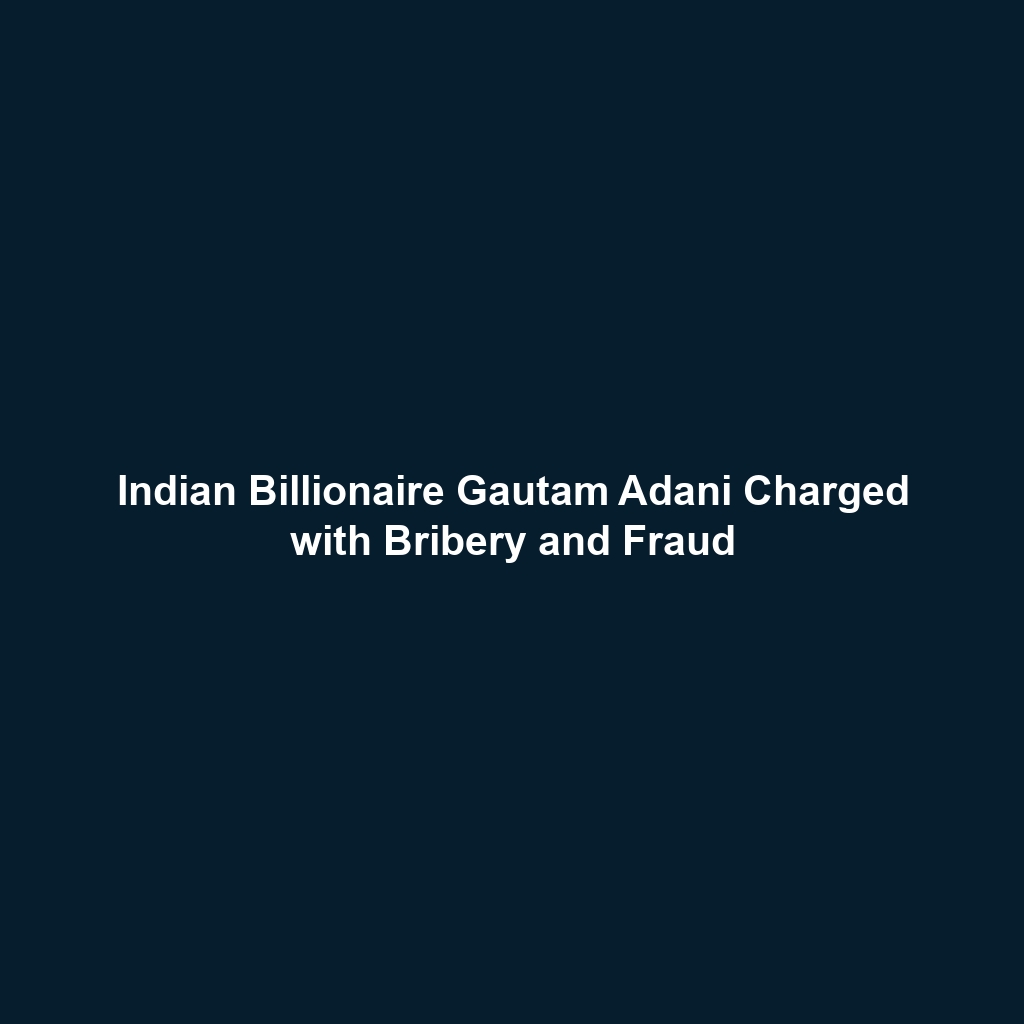Your cart is currently empty!
Tag: fraud

Gautam Adani Charged with Bribery and Fraud
Gautam Adani Charged with Bribery and Fraud
Gautam Adani Charged with Bribery and Fraud
In a significant legal development, Indian billionaire Gautam Adani has been charged with bribery and fraud by U.S. authorities. The allegations involve $265 million purportedly paid in bribes to secure contracts for solar energy projects. The charges were filed in a New York court, marking a critical moment in the ongoing scrutiny of Adani’s business practices.
The Charges Against Gautam Adani
Gautam Adani, founder and chairman of the Adani Group, is facing serious allegations involving illicit payments in connection with contracts related to solar energy projects in India. The U.S. Department of Justice has initiated legal proceedings that assert Adani and several associates engaged in a systematic scheme to bribe foreign officials to obtain contracts and facilitate operations in the renewable energy sector.
According to the charges, Adani allegedly authorized significant sums of money to be funneled through intermediaries to government officials in India. These payments were purportedly aimed at ensuring the company secured lucrative contracts in the burgeoning solar energy market, with investors expressing concern over the legality and ethics of such practices.
Background on Adani Group and Solar Energy
The Adani Group has rapidly ascended to prominence as one of India’s largest conglomerates, with interests spanning across various sectors, including energy, infrastructure, and logistics. In recent years, the group has made substantial investments in renewable energy, particularly solar. By 2022, it had become one of the world’s largest solar power producers.
However, rapid growth has accompanied scrutiny. Critics of the Adani Group have raised questions regarding transparency and compliance with international laws. The allegations of bribery come at a time when the global shift towards renewable energy is under intense examination, highlighting the complexities of navigating regulatory frameworks in emerging markets.
Legal Implications and Responses
The legal charges against Gautam Adani could have far-reaching implications for both the Adani Group and the broader business climate in India. If found guilty, Adani could face severe financial penalties and possible imprisonment. This situation also poses reputational risks for the Adani Group, which may impact investor confidence and future contracts.
In response to the charges, an Adani Group spokesperson stated, “The allegations are completely baseless and represent a mischaracterization of the company’s prudent business practices. We are fully committed to conducting our business in compliance with the law and with the highest ethical standards.” The statement reflects the firm’s intention to vigorously defend against the charges, which they believe will be proven unfounded.
Reactions from Experts and Market Analysts
Market analysts are closely watching the developments surrounding Adani. “The ramifications of these charges are significant not only for the Adani Group but for the perception of corporate governance in India,” noted financial analyst Ravi Kumar. He stresses that such allegations could lead to increased scrutiny of other Indian conglomerates, as investors seek clarity regarding regulatory compliance in the country.
Additionally, the ongoing investigations may have an adverse effect on foreign direct investment in India’s renewable energy sector. International investors often weigh legal stability and corporate integrity when committing resources to emerging markets. Concerns about governance could deter investment, which India is trying to attract to bolster its energy infrastructure.
The Broader Context of Corruption in India
The charges against Adani are emblematic of broader concerns surrounding corruption and governance within India’s political and business landscape. While India has made strides in combating corruption, challenges persist, particularly in large-scale infrastructure projects that often involve significant government interaction.
Experts suggest that cases like that of Adani are crucial for initiating discussions about reform in corporate governance and transparency. “This situation highlights the need for comprehensive reforms to curtail corruption and enhance accountability among corporate entities in India,” commented political analyst Anjali Mehta. The resolution of these legal challenges may determine the future of business ethics in the region.
Conclusion
The legal proceedings against Gautam Adani mark a pivotal point in the scrutiny of corporate governance among India’s business elite. With serious allegations of bribery and fraud now in the spotlight, the implications for Adani and the broader economic environment in India are profound. Investors, analysts, and policymakers will be keenly observing the outcome of this case, which may have lasting effects on how corporate entities operate within the framework of India’s regulatory landscape.
As the situation develops, further insights and updates will be critical for stakeholders invested in India’s economic future and its burgeoning renewable energy sector.

Indian Billionaire Gautam Adani Charged with Bribery and Fraud
Indian Billionaire Gautam Adani Charged with Bribery and Fraud
Indian billionaire Gautam Adani, one of the world’s wealthiest individuals and an influential business magnate, is facing serious charges of bribery and fraud in a massive U.S. case. These allegations, which have far-reaching implications for his companies and the Indian economy, were brought to light through a detailed investigation. The announcement has sent shockwaves across global financial markets, highlighting concerns about corporate governance and regulatory oversight.
Background on Gautam Adani
Born on June 24, 1962, in Ahmedabad, India, Gautam Adani is the founder and chairman of the Adani Group, a conglomerate with interests in ports, energy, agriculture, and infrastructure. Over the past decade, Adani has rapidly expanded his business empire, making him one of the wealthiest individuals in Asia and globally. According to Forbes, his net worth fluctuated significantly in recent years, showcasing the volatility linked to both his business operations and broader market conditions.
The Adani Group’s rise has not been without controversy, with allegations regarding its rapid growth and the financial practices deployed. The recent charges may expand the scrutiny Adani’s businesses are already under.
Details of the Allegations
The U.S. Department of Justice (DOJ) has formally charged Gautam Adani with participating in a scheme to bribe foreign officials in order to secure business advantages and contracts. Reports indicate that the investigation has uncovered credible evidence pointing to a series of illicit transactions facilitated by shell companies and intermediaries.
As per court documents, these transactions involved significant sums of money aimed at influencing decision-makers and securing lucrative contracts for Adani’s businesses abroad. Such allegations are particularly serious given the potential violation of the Foreign Corrupt Practices Act, a U.S. law that prohibits bribery of foreign officials.
Global Impact of the Charges
The fallout from these charges is expected to be widespread. Financial analysts predict that Adani Group’s stock prices may experience volatility as investors react to the news and evaluate the long-term implications for the conglomerate. Companies operating in jurisdictions susceptible to regulatory scrutiny might reconsider their partnerships with the Adani Group, potentially affecting future business opportunities.
Furthermore, this case could revive discussions around corporate ethics, governance policies, and compliance frameworks in emerging markets. The Adani case may become a pivotal moment for international business relations, particularly as countries navigate the growing necessity for transparency and accountability amid global trade.
Expert Opinions
Experts believe that the case against Adani could set a precedent for how international business dealings are conducted, especially concerning compliance with anti-bribery laws. Dr. Rajiv Kumar, an economist and former vice-chairman of India’s NITI Aayog, stated, “If proven, these allegations raise serious questions about the integrity of business practices not just in India, but globally. The international community may react strongly, further complicating India’s investment landscape.”
Legal analysts also weigh in, suggesting that the outcome of this case will heavily depend on the strength of the evidence against Adani. Emily Chen, a partner at a U.S.-based law firm specializing in corporate compliance, highlighted, “Prosecutors will have to demonstrate a clear link between Adani and the alleged misconduct. Convictions based on fraudulent transactions often hinge on the ability to establish intent and direct involvement.”
Reactions from the Adani Group
In response to the allegations, the Adani Group has publicly denied any wrongdoing. A statement released by the conglomerate emphasized its commitment to conducting business in accordance with the highest ethical standards. “We are reviewing the claims and will defend ourselves vigorously,” the statement read.
The group’s loyal investors and stakeholders await further developments, hoping for a swift resolution to prevent further destabilization of the company’s reputation and operations. Legal experts suggest that Adani’s legal strategy will likely involve both combating the allegations in court and attempting to mitigate reputational damage through public relations campaigns.
Potential Consequences and Future Outlook
The repercussions of this case extend beyond Gautam Adani and his conglomerate. Should the U.S. authorities succeed in their case, it may encourage a broader crackdown on corporate corruption involving international firms. The case serves as a crucial reminder of the potential risks associated with rapid expansion in a globalized business environment.
Moreover, if these allegations lead to criminal charges and subsequent convictions, the impact could resonate throughout the Indian business ecosystem, particularly influencing the industries that Adani is involved in. The case is likely to draw the attention of regulators and may prompt a review of existing protocols within companies operating in international markets.
As the legal proceedings unfold, the situation remains dynamic. Investors, market analysts, and business leaders worldwide will be closely monitoring developments. The outcome of this case could not only reshape the Adani Group’s future but could also serve as a yardstick for other global corporations regarding compliance and ethical business practices.
Conclusion
Gautam Adani’s current legal predicament underscores the increasing scrutiny placed on business practices in today’s global economy. With the charges of bribery and fraud highlighting systemic issues within corporate governance, the implications of this case could reverberate across industries and borders. As the investigation progresses, the world will be watching how one of India’s business titans navigates this challenging landscape.